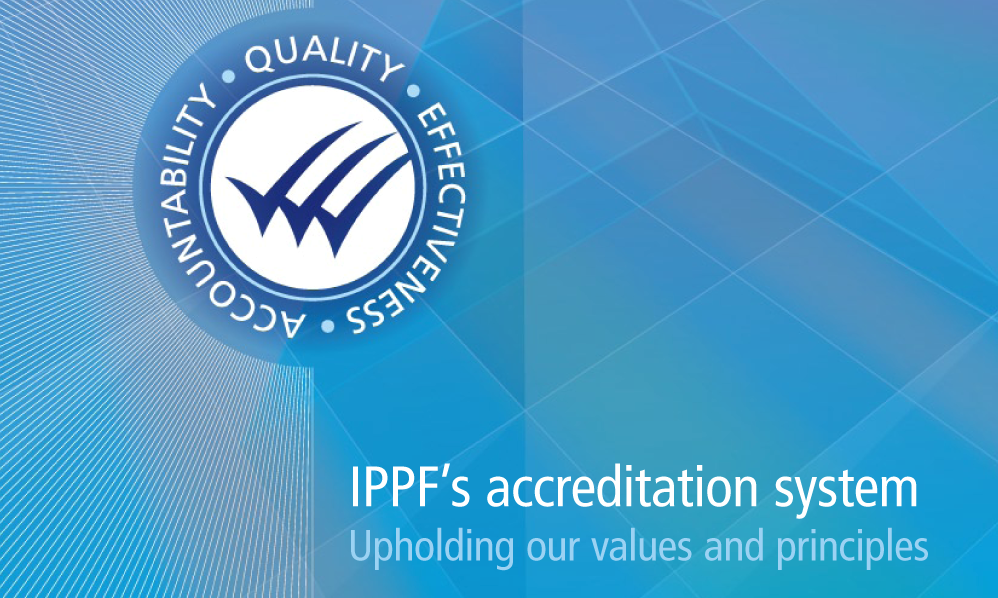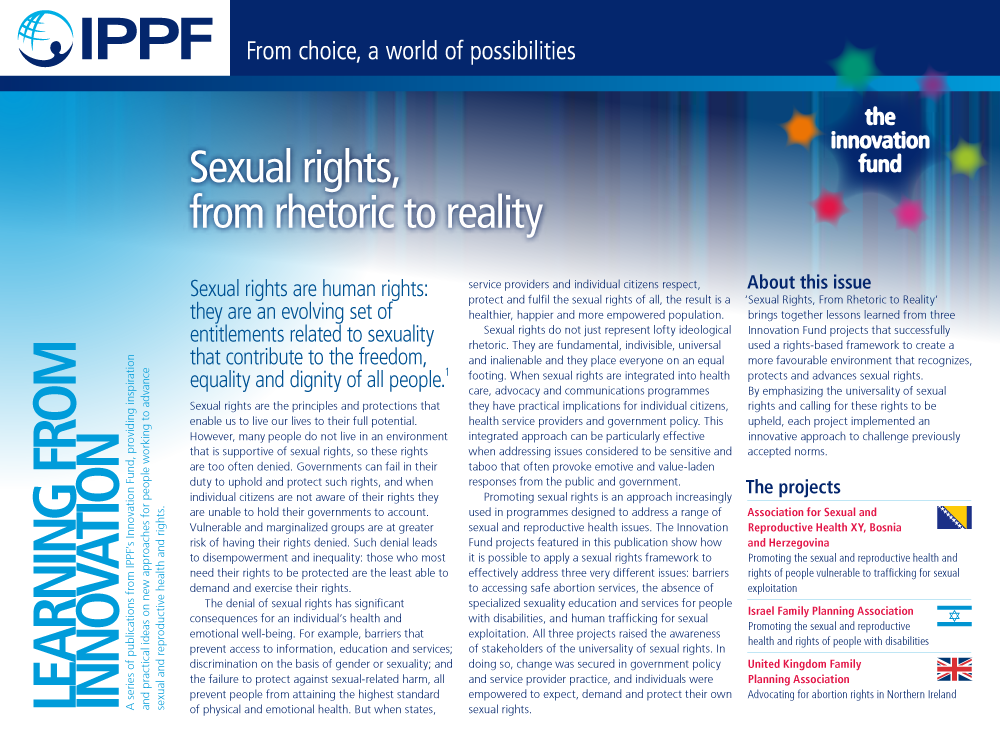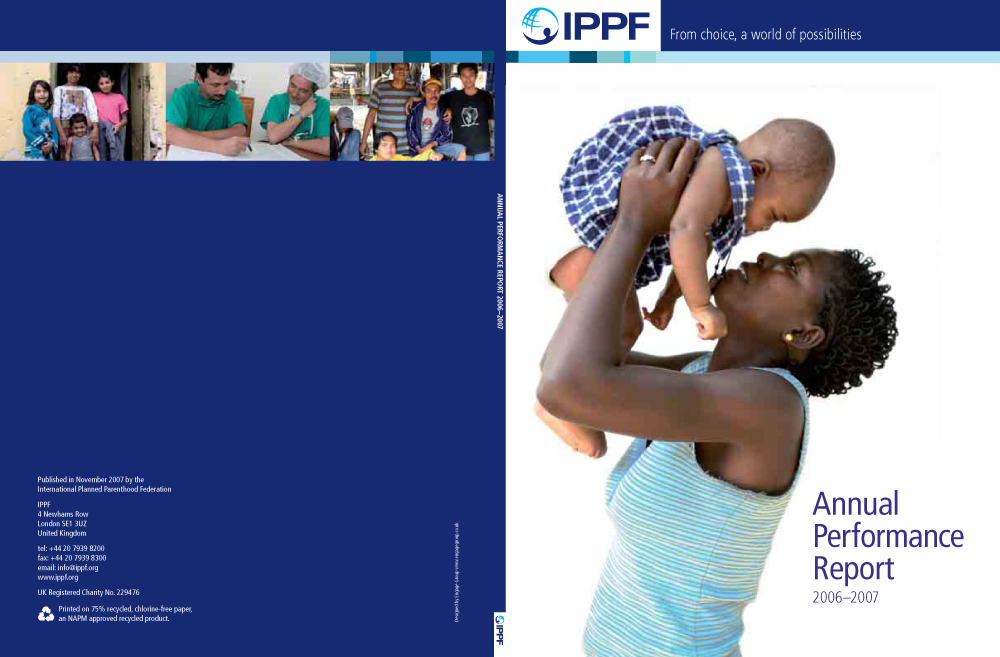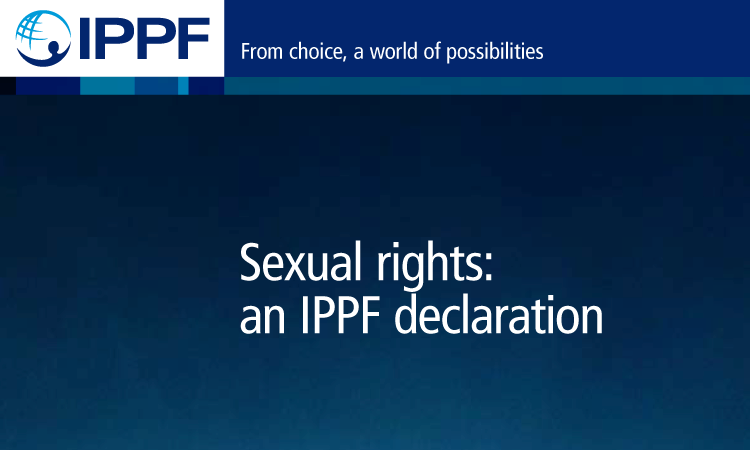Spotlight
A selection of resources from across the Federation

HIV Theory of Change
Our HIV Theory of Change is to clarify the goals and vision of IPPF’s HIV programme and to articulate the different pathways and strategies IPPF uses to contribute towards its HIV goals and vision.
Filter our resources by:


| 19 April 2012
IPPF's Accreditation System

| 19 April 2012
Sexual Rights: From rhetoric to reality
Sexual rights are the principles and protections that enable us to live our lives to their full potential. However, many people do not live in an environment that is supportive of sexual rights, so these rights are too often denied. Governments can fail in their duty to uphold and protect such rights, and when individual citizens are not aware of their rights they are unable to hold their governments to account. Vulnerable and marginalized groups are at greater risk of having their rights denied. Such denial leads to disempowerment and inequality: those who most need their rights to be protected are the least able to demand and exercise their rights. The denial of sexual rights has significant consequences for an individual’s health and emotional well-being. For example, barriers that prevent access to information, education and services; discrimination on the basis of gender or sexuality; and the failure to protect against sexual-related harm, all prevent people from attaining the highest standard of physical and emotional health. But when states, service providers and individual citizens respect, protect and fulfil the sexual rights of all, the result is a healthier, happier and more empowered population. Sexual rights do not just represent lofty ideological rhetoric. They are fundamental, indivisible, universal and inalienable and they place everyone on an equal footing. When sexual rights are integrated into health care, advocacy and communications programmes they have practical implications for individual citizens, health service providers and government policy. This integrated approach can be particularly effective when addressing issues considered to be sensitive and taboo that often provoke emotive and value-laden responses from the public and government. Promoting sexual rights is an approach increasingly used in programmes designed to address a range of sexual and reproductive health issues. The Innovation Fund projects featured in this publication show how it is possible to apply a sexual rights framework to effectively address three very different issues: barriers to accessing safe abortion services, the absence of specialized sexuality education and services for people with disabilities, and human trafficking for sexual exploitation. All three projects raised the awareness of stakeholders of the universality of sexual rights. In doing so, change was secured in government policy and service provider practice, and individuals were empowered to expect, demand and protect their own sexual rights. Sexual Rights, From Rhetoric to Reality brings together lessons learned from three Innovation Fund projects that successfully used a rights-based framework to create a more favourable environment that recognizes, protects and advances sexual rights. By emphasizing the universality of sexual rights and calling for these rights to be upheld, each project implemented an innovative approach to challenge previously accepted norms.

| 15 January 2012
HIV Works
The training content and exercises described in this guide are meant to offer ideas and inspiration for implementing your own HIV workplace policy. It is not an exhaustive guide and there are other training manuals that you may also wish to use to supplement this guide.

| 22 November 2011
Annual Performance Report 2006-07
This Annual Performance Report highlights some of IPPF’s achievements during 2006 from around the world. Case studies on each of IPPF's priority areas are presented from each of IPPF's Regions. The results shown in the organization's global indicators illustrate the progress being made in the implementation of IPPF's Strategic Framework 2005–2015. Key initiatives to improve the Federation’s organizational effectiveness and accountability are also highlighted.

| 21 November 2011
Exclaim! Young People's Guide to 'Sexual Rights: An IPPF declaration'
Exclaim – young people’s guide to ‘Sexual rights: an IPPF declaration’ builds on‘sexual rights: an IPPF Declaration’ introduces key concepts relating to human rights explains how human rights apply to young people’s sexuality examines ten fundamental sexual rights as they relate to young people supports young people to increase their understanding of sexual rights Young people are sexual beings. They have sexual needs, desires, fantasies and dreams. It is important for all young people around the world to be able to explore, experience and express their sexualities in healthy, positive, pleasurable and safe ways. This can only happen when young people’s sexual rights are guaranteed. Young people’s rights are often neglected, ignored or misunderstood; and young people are especially vulnerable to sexual rights violations. Exclaim sets out a framework for understanding how human rights apply to young people’s sexuality. It offers practical ideas about how to translate sexual rights into actions for and by young people: increase your own and your community’s knowledge and awareness about young people’s sexual rights and how they are different from adults’ rights improve youth-friendly sexual and reproductive health services improve and expand comprehensive sexuality education strengthen youth leadership and advocacy at local, national and regional levels Learn more about what the ten core sexual rights are and what each right means for young people: the right to equality the right to participation the right to life and to be free from harm the right to privacy the right to personal autonomy and to be recognized as an individual before the law the right to think and express oneself freely the right to health the right to know and learn the right to choose whether or not to marry or have children the right to have your rights upheld Includes: a glossary of key terms a table of human rights agreements that are relevant to sexual rights a poster summarising what sexual rights are and how they can help young people

| 25 May 2011
Sexual Rights: An IPPF declaration
Sexuality is a natural and precious aspect of life, an essential and fundamental part of our humanity. For people to attain the highest standard of health, they must first be empowered to exercise choice in their sexual and reproductive lives; they must feel confident and safe in expressing their own sexual identity. Today, discrimination, stigma, fear and violence pose real threats to many people. These threats and the actions they trigger – ranging from disheartening to life-threatening in nature – prevent many people from attaining basic sexual rights and health. IPPF is committed to fulfilling its goals through an approach that embodies the principles of universality, interrelatedness, interdependence and indivisibility of all human rights. We will do all we can to ensure that sexual rights – human rights – are respected through our own service provision and advocacy, and also in the wider public sphere. Sexual Rights: An IPPF Declaration represents the culmination of more than two years of work that spanned the globe. Its development was guided by a diverse group of individuals: internationally-renowned experts in sexual and reproductive health, human rights, law and public health; senior IPPF volunteers, each of whom brought unique regional perspectives and who together represented a range of experience and strengths; and three senior directors of the IPPF secretariat. The Declaration developed through regional meetings and events that took place across the Federation and built on the IPPF Charter of Sexual and Reproductive Rights. While there has already been some progress toward meeting the Millennium Development Goals and the targets of the 1994 ICPD (International Conference on Population and Development) Programme of Action, there is still much work to be done. Sexual rights are a component of human rights, they are an evolving set of entitlements related to sexuality that contribute to the freedom, equality and dignity of all people, and they cannot be ignored. We must persevere; we must be uncompromising and passionate in our efforts to decrease stigma and improve access to services, and to increase recognition of sexuality as a positive aspect of human life. Marginalized groups such as young people, transgender people, sex workers, men having sex with men, people who are gay, lesbian or bi-sexual, child brides and girl mothers particularly need our compassion. The Declaration applies equally to girls and women who are vulnerable to or have been subjected to gender-based violence, including traditional norms such as female genital mutilation and discrimination based on male preference. Sexual Rights: An IPPF Declaration is an indispensable tool for all organizations, activists, researchers, policy- and decision-makers who are working to promote and ensure human rights. The Declaration will enable members of the sexual and reproductive health and human rights communities to create change and build on the momentum that has already begun around sexual rights in preparation for the next International Conference on Population and Development in 2015. Too often denied and too long neglected, sexual rights deserve our attention and priority. It is time to respect them. It is time to demand them. We trust that the Declaration will serve you well on the journey ahead.















